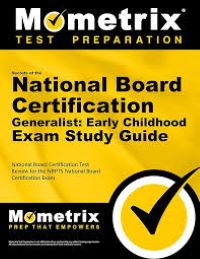National Board Certification Generalist: Early Childhood Exam
The National Board Certification for Teachers is a prestigious certification that aims to advance the quality of teaching and learning by maintaining high and rigorous standards for what accomplished teachers should know and be able to do. The Generalist: Early Childhood certification is one of the many offered by the National Board for Professional Teaching Standards (NBPTS). This certification is designed for teachers who work with young children, typically from ages 3 to 8, and focuses on the unique needs and developmental stages of early childhood education.
Eligibility
To be eligible for the National Board Certification as a Generalist in Early Childhood, candidates must meet several criteria. Firstly, candidates must hold a bachelor's degree from an accredited institution. Additionally, they must have completed at least three years of successful teaching experience in early childhood education. This experience must be supported by documentation from their employer. Furthermore, candidates must possess a valid state teaching license for the same period, ensuring that they are recognized as qualified educators in their respective states. Lastly, candidates should demonstrate their commitment to ongoing professional development and a desire to improve their teaching practice through the certification process.
Syllabus
The syllabus for the National Board Certification Generalist: Early Childhood exam is comprehensive and covers various aspects of early childhood education. The certification process is divided into four components, each focusing on different areas of teaching and learning.
- Component 1: Content Knowledge - This component assesses the candidate's knowledge of early childhood content, including language arts, mathematics, social studies, science, and the arts. Candidates are required to demonstrate their understanding of how to effectively teach these subjects to young children.
- Component 2: Differentiation in Instruction - This component requires candidates to submit a portfolio entry that demonstrates their ability to differentiate instruction to meet the diverse needs of their students. Candidates must provide evidence of how they adapt their teaching strategies to accommodate different learning styles, abilities, and cultural backgrounds.
- Component 3: Teaching Practice and Learning Environment - This component involves video recordings of the candidate's teaching practice, along with a written analysis of their instructional decisions. Candidates must showcase their ability to create a positive and inclusive learning environment that supports the social, emotional, and cognitive development of young children.
- Component 4: Effective and Reflective Practitioner - This component requires candidates to demonstrate their ability to assess and reflect on their teaching practice. Candidates must provide evidence of how they use assessment data to inform their instructional decisions and improve student learning outcomes.
Format of the Exam
The National Board Certification Generalist: Early Childhood exam is designed to be rigorous and comprehensive, ensuring that candidates have a deep understanding of early childhood education. The exam is divided into two main parts: the assessment center exercises and the portfolio entries.
Assessment Center Exercises - The assessment center exercises are computer-based tests that evaluate the candidate's content knowledge and pedagogical skills. These exercises are typically conducted at a designated testing center and consist of multiple-choice questions and constructed response items. The assessment center exercises are designed to measure the candidate's ability to apply their knowledge in real-world teaching scenarios.
Portfolio Entries - The portfolio entries are an essential component of the certification process and require candidates to submit evidence of their teaching practice. Candidates must complete four portfolio entries, each corresponding to one of the components outlined in the syllabus. The portfolio entries require candidates to provide detailed descriptions of their teaching practice, along with supporting evidence such as student work samples, lesson plans, and video recordings of their teaching.
The portfolio entries are submitted electronically, and candidates are expected to adhere to specific formatting and submission guidelines. The entries are evaluated by trained assessors who use a standardized scoring rubric to assess the quality of the candidate's teaching practice and their ability to meet the National Board's standards for accomplished teaching.
Conclusion
The National Board Certification Generalist: Early Childhood exam is a rigorous and comprehensive assessment that evaluates the knowledge and skills of early childhood educators. By achieving this certification, teachers demonstrate their commitment to excellence in teaching and their dedication to the development and learning of young children. The certification process not only enhances the professional growth of educators but also contributes to the improvement of teaching practices and student learning outcomes in early childhood education.
National Board Certification Generalist: Early Childhood Exam
Study Guide and Test Preparation for National Board Certification Generalist: Early Childhood Exam
A Complete National Board Certification Generalist: Early Childhood Exam Study Guide that includes sample questions, test tips and a complete study plan prepared by a team of expert and dedicated researchers. Cost-effective and qualified exam help from a committed exam preparation company.
Secrets of the National Board Certification Generalist: Early Childhood Exam (printed book)
Secrets of the National Board Certification Generalist: Early Childhood Exam (ebook download)
Secrets of the National Board Certification Generalist: Early Childhood Exam Flashcards

